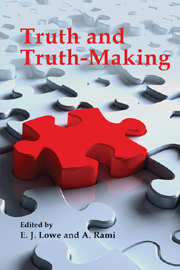1 - Introduction: truth and truth-making
Summary
The aim of this essay is to provide a detailed and critical overview of the main topics and problems of the current debate concerning truth-making. In §1 I give a brief outline of the history of the theory of truth-making and in §2 I identify three central goals of such a theory. In §3 I introduce the truth-maker principle and the doctrines of truth-maker maximalism and truth-maker purism. Section 4 contains a discussion and critique of several attempts to justify the truth-maker principle and §5 introduces some distinctions that concern different possible formal and ontological properties of the truth-making relation. In §6 I argue for the thesis that propositions conceived as certain kinds of abstract objects are the best candidates to fill the role of primary truth-bearers. Section 7 is about the explication of the truth-maker relation; I shall discuss and criticize a considerable number of the attempts at explication that have been made. In §8 I introduce further principles that may be combined with the truth-maker principle. It will be shown that some of these principles imply implausible consequences if they are combined with certain explications of the truth-maker principle. Section 9 is concerned with so-called supervenience principles concerning truth. I shall assess the claim that these principles are plausible replacements for the truth-maker principle. Section 10 contains four arguments against the thesis that a truth-maker theory may be conceived of as a theory of truth.
- Type
- Chapter
- Information
- Truth and Truth-Making , pp. 1 - 36Publisher: Acumen PublishingPrint publication year: 2008
- 2
- Cited by



